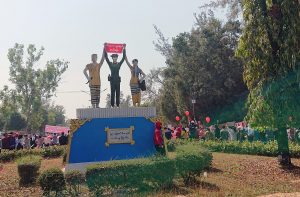Since Myanmar’s coup on February 1, the world has looked to China and the nations of the Association of Southeast Asian Nations (ASEAN), neighboring countries with significant leverage over Myanmar, to help mediate a solution to the country’s escalating crisis and return the country to a democratic path. But the principal of “non-interference” has once again become a hindrance.
The question is, in a crisis as serious as that currently gripping Myanmar, can the non-interference principle still hold, or does non-interference inadvertently constitute a form of interference in support of the military regime and its brutal treatment of anti-coup protesters?
Founded in 1967, ASEAN is a regional organization comprising 10 member states. Myanmar joined the bloc in 1997, at the peak of then dictator Sen. Gen. Than Shwe’s rule.
Throughout this period, ASEAN was seen inside Myanmar as an enabler of the country’s military dictatorship, not least because it was the only forum in which the military leadership could freely mingle with the leaders of other countries. ASEAN did not appear visibly concerned about the human rights violations committed by the military junta, except for when the Aung San Suu Kyi-led government was in power after 2015.
Once again, ASEAN has remained relatively muted about the military’s latest coup and the intensifying violence by the new junta. Although some member states, particularly Malaysia, Singapore, and Indonesia, have broken ranks to call out the military’s atrocities since the beginning of the crisis, ASEAN as a collective body has been incapacitated by the “non-interference” principle of its charter.
China, a global superpower and a next-door neighbor that has significant economic and strategic ties to Myanmar, has similarly taken shelter under the non-interference principle. It has made it clear that the current crisis is an internal matter and that the people of Myanmar should find a resolution through dialogue under the constitution. China even refrained from calling the military takeover “a coup” and intervened (along with Russia, India, and Vietnam) to prevent the United Nations Security Council from referring to the takeover as a “coup” in the Presidential Statement issued earlier this month. Meanwhile, the Chinese state news agency Xinhua called the military’s seizure of power a “major cabinet reshuffle.”
However, after reports of vandalism of Chinese-financed factories in Myanmar, Beijing intervened instantly and called for the military to take tougher action. In a strongly worded opinion piece, CGTN news said, “China won’t allow its interests to be exposed to further aggression,” adding that it “might be forced into taking more drastic action to protect its interests.” These words suggest that China desires stability in Myanmar above all else. But the military coup has not brought stability to the country; if anything, it has done the opposite. Therefore, by not standing with the people of Myanmar, China is acting counter to its own interests.
The military’s justification for its seizure of power stems from the November 2020 general elections, which resulted in another landslide victory for Aung San Suu Kyi and her party, the National League for Democracy (NLD). The military claims there was widespread voter fraud solely based due to erroneous voter registration lists. Although some agree that the election was not completely free and fair, given that it excluded some ethnic constituencies from the polls due to “security concerns,” observers concurred that errors in voter registration lists do not translate into widespread fraud in the elections.
In a recent interview with The Diplomat, Melissa Crouch, a professor at the Faculty of Law & Justice at the University of New South Wales, explained that the military’s claims that the Union Election Commission and parliament had failed to investigate fraud allegations, thus constituting a legally valid justification for the seizure of state power, were “hollow.” She argued further that the detention of President Win Myint was “a breach of the Constitution” and that as a result, the military does not have the “constitutional mandate to rule.” It shows that the military seized power not out of necessity, but simply because it could.
Following the coup, at least 459 people, including many minors, have been brutally killed and nearly 3,000 arbitrarily arrested. The economy has plummeted with banks shutting and the import-export sector paralyzed. The government machinery is barely running due to nationwide work stoppages by private and public sector workers. The United Nations World Food Program has warned that the country faces an eminent risk of hunger. The U.N. envoy of the deposed government has said that the country is heading for a civil war.
The current crisis in Myanmar is not the issue of policy differences nor election disputes pending resolutions. The coup was in clear violation of the country’s constitution and the people’s fundamental rights. The subsequent actions of the military have been in clear violation of the international community’s call for restraint. It has already inflicted insurmountable economic suffering on the people and yet another humanitarian catastrophe is set to unfold if the situation is not addressed urgently.
The silence of ASEAN and China is deafening, and their inaction has merely encouraged the military to terrorize its own people. Their principle of non-interference has therefore become contradictory, in that it signals the military’s immunity from any adverse actions by ASEAN and China for its unconstitutional and illegitimate seizure of state power. The inaction of China and the Southeast Asian bloc has ensured that might has become right in Myanmar.
































